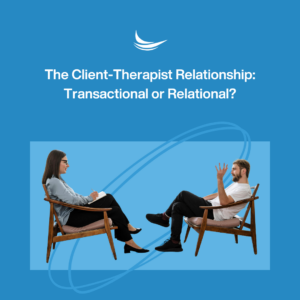The Client-Therapist Relationship: Transactional or Relational?
 There are so many relational interactions in our world that are transactional. You pay a fee and receive goods or services. You do a favor and expect something back in return. In some transactions, you may have no or limited interaction with an actual person. Some people prefer the convenience of not having to bother with the interpersonal side of exchanges. There is a transactional element that is present in receiving therapeutic services; however, a strong therapeutic relationship is vital to the success of therapy. A systematic review and evaluation of research found that the majority (over 70%) found the therapeutic alliance as a mediator of change.
There are so many relational interactions in our world that are transactional. You pay a fee and receive goods or services. You do a favor and expect something back in return. In some transactions, you may have no or limited interaction with an actual person. Some people prefer the convenience of not having to bother with the interpersonal side of exchanges. There is a transactional element that is present in receiving therapeutic services; however, a strong therapeutic relationship is vital to the success of therapy. A systematic review and evaluation of research found that the majority (over 70%) found the therapeutic alliance as a mediator of change.
Therapists intentionally work to build rapport, starting with the first session. Your therapist wants the space to feel welcoming and safe—a place where you can feel seen, heard, and understood. Clients want to know that there is hope that the presenting concerns are treatable and that things will get better. Communication is reciprocal,meaning that it goes both ways. Clients are encouraged to ask questions and share feedback. The therapist is the expert in mental health, while the client is the expert of their own experiences. Ideally, the relationship feels balanced by being grounded within the relationship.
Mutual respect should be reciprocal within relationships. For example, it is important for both clients (and their therapists) to consistently show up to sessions and be on time, communicating in advance any schedule changes. It is appreciated to have communication when clients decide to end therapy, especially when the decision is abrupt. No one likes to be “ghosted”. Your therapist cares about you and your well-being and shows concern. We welcome your feedback and want therapy to be a positive, transformative experience.
I genuinely care for all my clients and am interested and invested in what is going on in their lives. Our relationships are meaningful, and I am excited to be a part of their life story. I prioritize showing up as fully present and taking care of myself to help take care of others. As therapists, we bring ourselves as therapists to the room. Therapy is a place where you can come and receive unconditional positive regard, compassion, and kindness. This can be demonstrated through actions such as empathic listening and validation.
A relational client is invested in the therapy process and has a high commitment to themselves, to the therapy process, and treatment recommendations. Longer-term relationships can help develop deeper emotional connections. Relationships may naturally ebb and flow from weekly to every other week to monthly. After discharge, clients feel comfortable reaching out in the future, as needed. Client satisfaction is high.
A transactional client may view the therapy process as a business transaction focused on the exchange of services (money/ insurance in exchange for a session) rather than be interested in a therapeutic relationship. It can feel a bit uncomfortable for some clients to adjust to a therapy relationship when in and out of medical or mental health care (often for urgent or crisis reasons). These relationships are typically short-term, seeing the first available provider as needed without establishing care with a particular provider.
On the other hand, transactional clients may be “therapist shoppers”. This individual may have several sessions in a short amount of time to select the “best” provider, interviewing providers who can provide the best product. The mindset is “I expect ____ from you. What can you do for me?” While it is good to know what you are looking for, even expert therapists are still people.
Transactional clients may be looking for a “quick fix” or benefit such as having forms completed that are outside the scope of therapy, and not interested in therapy itself. When there is not an investment in the therapist process and commitment is low, the result is often frequent missed or no-show appointments. Unfortunately, clients may never get to “the heart of therapy” when there are less than two sessions after intake and treatment planning.
No matter where you are at, or what patterns you see in yourself, I wish you the best of luck on your therapy journey. I hope that you and your therapist develop a strong relationship, so you get the most out of the therapy experience. I am excited about the work that you are (or will be) doing, and the transformation ahead.
Written By: Charlotte Johnson, MA, LPCC



























